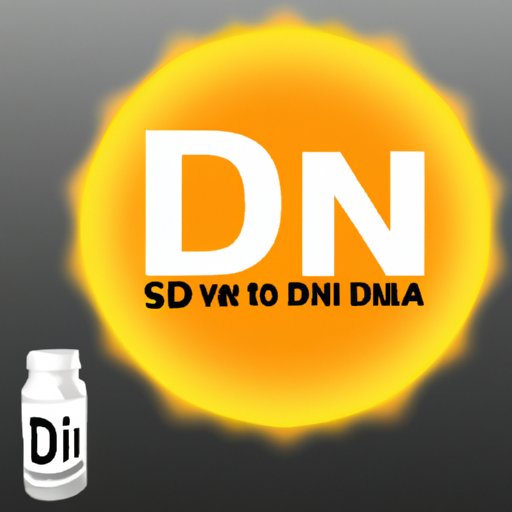Introduction
Vitamin D is an essential nutrient that plays a vital role in human health. It’s found naturally in some foods, but it can also be taken as a supplement. As such, many people are asking the question: what vitamin D should I take? This article will provide a comprehensive guide to choosing the right vitamin D supplement for your needs.

A Guide to Choosing the Right Vitamin D Supplement
When it comes to selecting a vitamin D supplement, there are a few important things to consider. First, you need to understand the Recommended Dietary Allowance (RDA) and International Units (IU). The RDA is the amount of a nutrient that experts recommend you consume each day, while IU is the unit used to measure the potency of a vitamin D supplement.
In addition, there are several different forms of vitamin D supplements available on the market. These include vitamin D2, vitamin D3, and vitamin D with K2. Each form has its own advantages and disadvantages, so it’s important to research each option before making a decision.
Finally, when selecting a vitamin D supplement, you should take into account factors such as age, sex, diet, lifestyle, and medical history. For example, pregnant women may require higher doses of vitamin D than non-pregnant women. Similarly, people who do not get enough sun exposure may need to increase their intake of vitamin D.
How Vitamin D Can Improve Your Health
Vitamin D has many benefits for mental and physical health. For example, studies have shown that it can help reduce symptoms of depression and anxiety and improve cognitive performance. Additionally, vitamin D can help protect against certain types of cancer, such as breast and colon cancer.
Vitamin D is also essential for bone and muscle health. It helps regulate calcium and phosphorus levels in the blood, which are necessary for maintaining strong bones and muscles. Additionally, vitamin D can reduce inflammation in the body and boost immune system function.
The Benefits of Vitamin D and Its Recommended Dosage
The potential benefits of taking a vitamin D supplement are numerous. However, it is important to note that the exact dosage required varies from person to person. Generally speaking, adults aged 19-70 should aim to consume 600 IU (15mcg) of vitamin D per day, while adults over the age of 70 should aim for 800 IU (20mcg) per day.

An Overview of Different Types of Vitamin D Supplements
As mentioned previously, there are several different forms of vitamin D supplements available. Here is an overview of the three main types:
Vitamin D2
Vitamin D2 is a synthetic form of vitamin D produced by exposing certain fungi to ultraviolet light. It is less potent than vitamin D3, but it is still effective at raising vitamin D levels in the body.
Vitamin D3
Vitamin D3 is the natural form of vitamin D that is produced in the skin when exposed to sunlight. It is more potent than vitamin D2 and is more easily absorbed by the body.
Vitamin D with K2
Vitamin D with K2 is a combination of vitamins D and K. Vitamin K helps the body absorb calcium, which is beneficial for bone health. This type of supplement is often recommended for people at risk of developing osteoporosis.

Understanding the Role of Vitamin D in the Human Body
Vitamin D is essential for regulating calcium and phosphorus levels in the blood. It also helps control cell growth and development, and it plays a role in the immune system. Furthermore, studies have shown that vitamin D deficiency can lead to a number of health problems, including fatigue, muscle weakness, bone pain, and even depression.
Foods Rich in Vitamin D and How to Get Enough Daily
There are a variety of foods that are rich in vitamin D, including fatty fish, egg yolks, and mushrooms. Additionally, many dairy products and breakfast cereals are fortified with vitamin D. To ensure adequate daily intake of vitamin D, it is recommended that adults get at least 10–15 minutes of direct sunlight exposure or consume 3–4 servings of vitamin D-rich foods per day.

Exploring the Potential Side Effects of Taking Vitamin D Supplements
It is important to note that taking too much vitamin D can cause side effects such as nausea, vomiting, constipation, and headaches. Additionally, taking high doses of vitamin D can lead to an increased risk of kidney stones and other kidney diseases. Therefore, it is important to consult a healthcare professional before taking any form of vitamin D supplement.
Conclusion
Vitamin D is an essential nutrient that plays a vital role in human health. When it comes to selecting a vitamin D supplement, it is important to understand the RDA and IU, as well as the different forms of supplements available. Additionally, it is important to take into account factors such as age, sex, diet, lifestyle, and medical history. Lastly, it is important to be aware of the potential side effects of taking too much vitamin D and to consult a healthcare professional before taking any supplement.


